 Oud, Lute, acoustic guitar, or lap steel guitar? While my musical knowledge is varied, my ear is not trained to pick out the many instruments used or mimicked by Bishop. He makes guitars sound like any of these aforementioned instruments, at any point in time, with practiced fingers and the equivalent musical knowledge of a library with every note he plays, a master guitarist proficient in a variety of guitar techniques and knowledge of music traditions. His latest album excels in his freer use of experimentation with theme and electronics, crafting a "dream pharmacy" as the title implies.
Oud, Lute, acoustic guitar, or lap steel guitar? While my musical knowledge is varied, my ear is not trained to pick out the many instruments used or mimicked by Bishop. He makes guitars sound like any of these aforementioned instruments, at any point in time, with practiced fingers and the equivalent musical knowledge of a library with every note he plays, a master guitarist proficient in a variety of guitar techniques and knowledge of music traditions. His latest album excels in his freer use of experimentation with theme and electronics, crafting a "dream pharmacy" as the title implies.
Two new shows just for you. We have squeezed out two extended release episodes for this weekend to get you through this week. They contain mostly new songs but there's also new issues from the vaults. The first show features music from Rider/Horse, Mint Field, Robert Aiki Aubrey Lowe, Anastasia Coope, ISAN, Stone Music, La Securite, Bark Psychosis, Jon Rose, Master Wilburn Burchette, Umberto, Wand, Tim Koh, Sun An, and Memory Drawings. The second episode has music by Laibach, Melt-Banana, Chuck Johnson, X, K. Yoshimatsu, Dorothy Carter, Pavel Milyakov, Violence Gratuite, Mark Templeton, Dummy, Endon, body / negative, Midwife, Alberto Boccardi, Divine. Cow in Maui from Veronika in Vienna. Get involved: subscribe, review, rate, share with your friends, send images! |



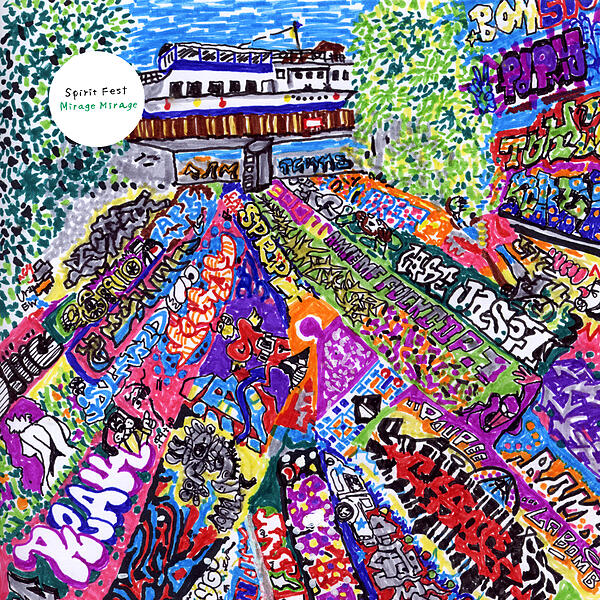 Spirit Fest is a supergroup built around acclaimed Japanese duo Tenniscoats, featuring members of Notwist, Jam Money, and Joasihno. If an album could be adorkable, this fits the bill. Mirage Mirage is an album for flower picking and bubble blowing, and it charmed me from the first listen.
Spirit Fest is a supergroup built around acclaimed Japanese duo Tenniscoats, featuring members of Notwist, Jam Money, and Joasihno. If an album could be adorkable, this fits the bill. Mirage Mirage is an album for flower picking and bubble blowing, and it charmed me from the first listen. Louise Bock is the latest guise of iconoclastic composer Taralie Peterson, who is best known for her role in psych-folk luminaries Spires That in the Sunset Rise. It is probably fair to describe some of her previous work as "polarizing" or "an acquired taste," as she is not one to shy away from dissonance or nerve-jangling intensity. However, it is also fair to say that she has recorded some truly transcendent and impressively wild pieces over the years. In some ways, Abyss: For Cello captures Peterson in comparatively accessible form, but that is mostly because there are limits to how much infernal cacophony one person can create with just a cello and a saxophone. That said, that limit is considerably higher than I would have expected, as Abyss is quite a churning and heaving one-woman tour de force of cello-driven violence. Moreover, it is quite an impressively focused and tightly edited one as well. It is quite a pleasure to witness Peterson's power so beautifully harnessed for maximum impact, particularly on the album's brilliant centerpiece "Oolite."
Louise Bock is the latest guise of iconoclastic composer Taralie Peterson, who is best known for her role in psych-folk luminaries Spires That in the Sunset Rise. It is probably fair to describe some of her previous work as "polarizing" or "an acquired taste," as she is not one to shy away from dissonance or nerve-jangling intensity. However, it is also fair to say that she has recorded some truly transcendent and impressively wild pieces over the years. In some ways, Abyss: For Cello captures Peterson in comparatively accessible form, but that is mostly because there are limits to how much infernal cacophony one person can create with just a cello and a saxophone. That said, that limit is considerably higher than I would have expected, as Abyss is quite a churning and heaving one-woman tour de force of cello-driven violence. Moreover, it is quite an impressively focused and tightly edited one as well. It is quite a pleasure to witness Peterson's power so beautifully harnessed for maximum impact, particularly on the album's brilliant centerpiece "Oolite."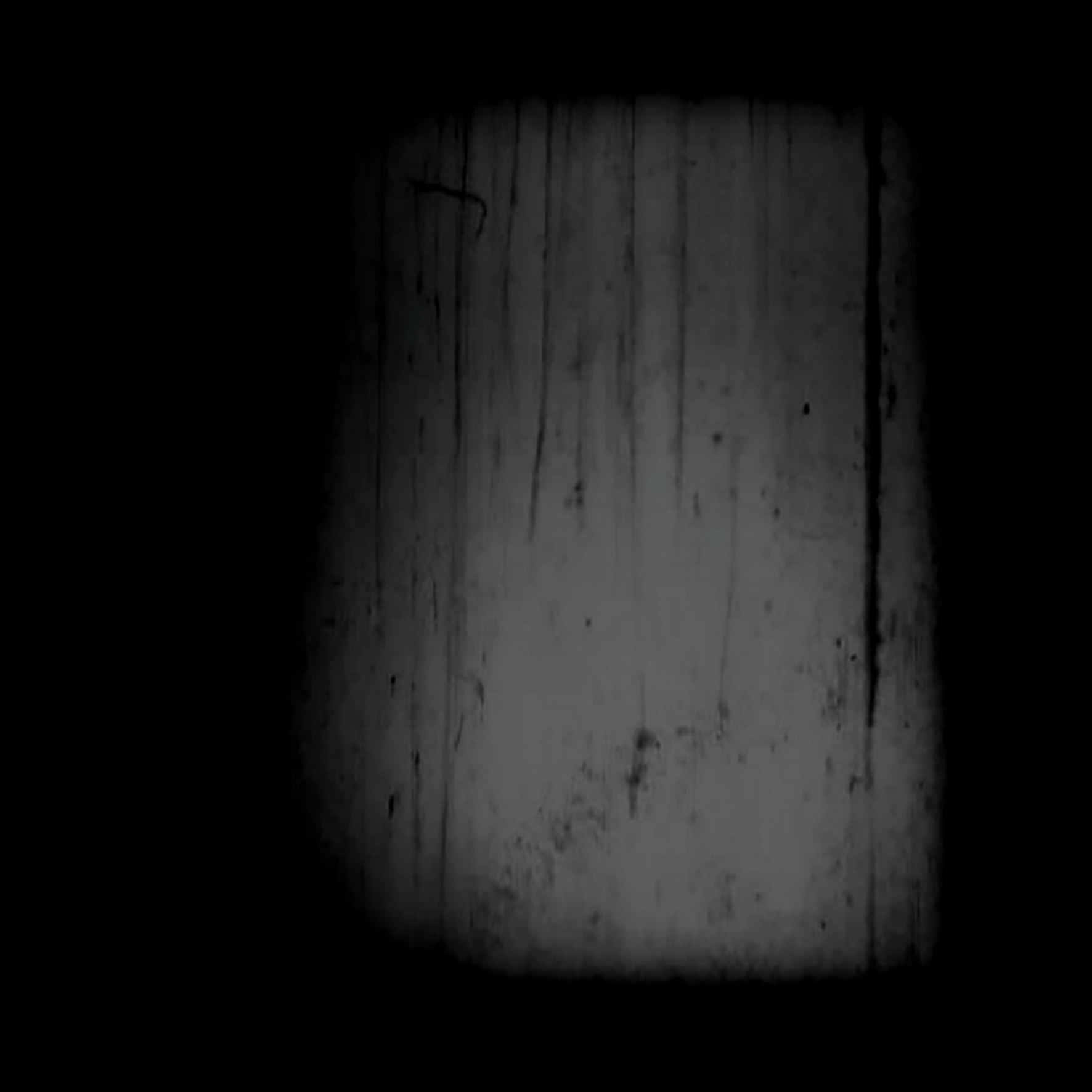 I know very little about Nicole Oberle and I suspect that suits her just fine, as she self-describes as a "digital recluse." What I do know is that she is based in Texas and that she has recorded quite a prolific stream of self-released material over the last year or so. One of those releases was last fall's Skin EP, which has since been picked up and reissued in expanded form by Whited Sepulchre. That is great news for a couple of reasons, as I would not have encountered her work otherwise and this new incarnation of Skin is a significantly more substantial and compelling release than its predecessor. In fact, the newly added songs are some of my favorite ones on the album. As such, I suspect this incarnation of Skin will rightfully go a long way towards expanding Oberle's fanbase, as there are appealing shades of both Grouper and erstwhile labelmate Midwife lurking among these eleven songs. The most fascinating parts of the album, however, are the ones where those influences collide with Oberle's divergent interests in ghostly, downtempo R&B grooves and unsettling, diaristic sound collages.
I know very little about Nicole Oberle and I suspect that suits her just fine, as she self-describes as a "digital recluse." What I do know is that she is based in Texas and that she has recorded quite a prolific stream of self-released material over the last year or so. One of those releases was last fall's Skin EP, which has since been picked up and reissued in expanded form by Whited Sepulchre. That is great news for a couple of reasons, as I would not have encountered her work otherwise and this new incarnation of Skin is a significantly more substantial and compelling release than its predecessor. In fact, the newly added songs are some of my favorite ones on the album. As such, I suspect this incarnation of Skin will rightfully go a long way towards expanding Oberle's fanbase, as there are appealing shades of both Grouper and erstwhile labelmate Midwife lurking among these eleven songs. The most fascinating parts of the album, however, are the ones where those influences collide with Oberle's divergent interests in ghostly, downtempo R&B grooves and unsettling, diaristic sound collages. Creating memorable music is not always about throwing musical spaghetti at the wall to see what sticks; like any recipe, there are common ingredients to music’s magic—tempo, chorus and yes, a certain predictability—and the best dishes come from the extrapolation of the cook’s own prime ingredients into their own musical concoctions. Having a formula is no more dangerous to "real" music as a recipe is to a "real" chef; the best music in the hands of masters balances an adherence to these rules with free-flowing creativity, while those less experienced either know nothing about the recipe, or follow the recipe too strictly. Boston based trio E comprises all masters: guitarist Thalia Zedek (Come, Uzi, Live Skull), guitarist and inventor Jason Sidney Sanford (Neptune) and drummer Gavin McCarthy (Karate). Their third release doesn’t create any new formulas, but rather expounds on the tasty blend of the prior two releases, honing the skills of three masters into an even finer dish of practiced and precise dark energy.
Creating memorable music is not always about throwing musical spaghetti at the wall to see what sticks; like any recipe, there are common ingredients to music’s magic—tempo, chorus and yes, a certain predictability—and the best dishes come from the extrapolation of the cook’s own prime ingredients into their own musical concoctions. Having a formula is no more dangerous to "real" music as a recipe is to a "real" chef; the best music in the hands of masters balances an adherence to these rules with free-flowing creativity, while those less experienced either know nothing about the recipe, or follow the recipe too strictly. Boston based trio E comprises all masters: guitarist Thalia Zedek (Come, Uzi, Live Skull), guitarist and inventor Jason Sidney Sanford (Neptune) and drummer Gavin McCarthy (Karate). Their third release doesn’t create any new formulas, but rather expounds on the tasty blend of the prior two releases, honing the skills of three masters into an even finer dish of practiced and precise dark energy.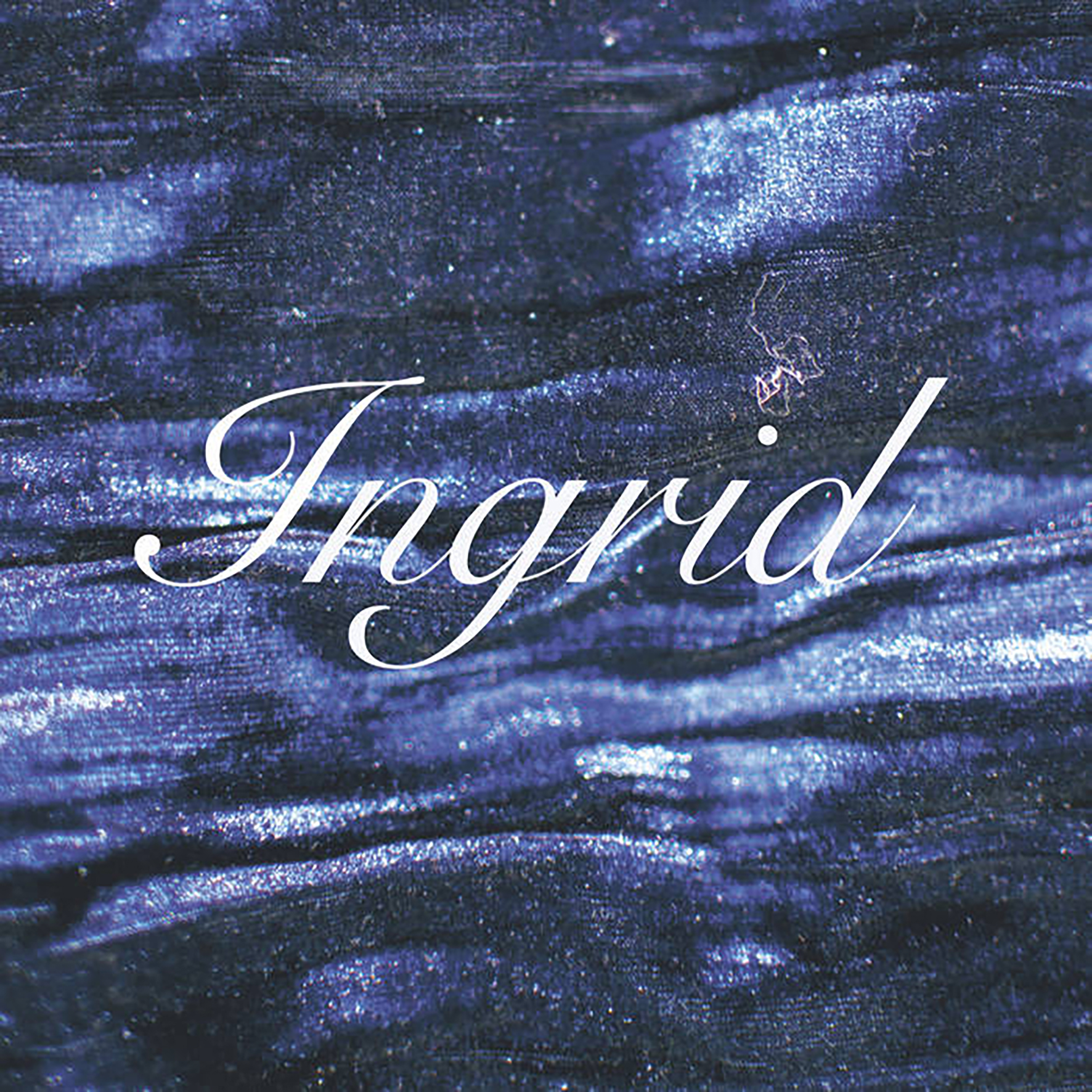 I was quite curious to see which direction Klara Lewis's latest album would take, as her previous solo releases were generally quite radical and hyper-constrained in their avoidance of anything resembling conventional instrumentation. While both Ett and Too are aptly described by Editions Mego as "eerie rhythmic variations," such a summary falls short in conveying the uniqueness of Lewis's vision, as it often felt like she was quixotically attempting to compose pop songs solely from murky field recordings and decontextualized fragments of beats and melodies. With Ingrid, however, Lewis makes a dramatic and unexpected aesthetic reversal, as she slowly transforms a haunting and melodic cello loop into a wonderfully gnarled and heaving longform piece.
I was quite curious to see which direction Klara Lewis's latest album would take, as her previous solo releases were generally quite radical and hyper-constrained in their avoidance of anything resembling conventional instrumentation. While both Ett and Too are aptly described by Editions Mego as "eerie rhythmic variations," such a summary falls short in conveying the uniqueness of Lewis's vision, as it often felt like she was quixotically attempting to compose pop songs solely from murky field recordings and decontextualized fragments of beats and melodies. With Ingrid, however, Lewis makes a dramatic and unexpected aesthetic reversal, as she slowly transforms a haunting and melodic cello loop into a wonderfully gnarled and heaving longform piece.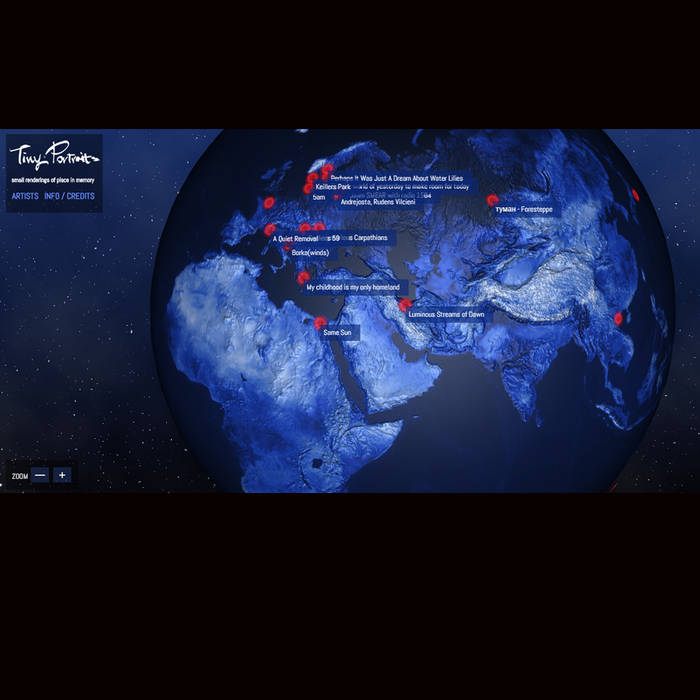 International sound art label Flaming Pines has collected 24 singles in the Tiny Portraits series to form this pay what you want compilation of music dedicated to overlooked places. Each artist was asked to examine a physical space or location, and create a portrait of that space using whatever mode of creative inquiry they have in their toolbox. As an album, the music veers through manifestations of sound, with peaks and contours that are mostly peaceful in character. The result is an evocative, varied collection, with each piece a startlingly unique contribution to the whole, to be enjoyed as part of a journey through physical reality.
International sound art label Flaming Pines has collected 24 singles in the Tiny Portraits series to form this pay what you want compilation of music dedicated to overlooked places. Each artist was asked to examine a physical space or location, and create a portrait of that space using whatever mode of creative inquiry they have in their toolbox. As an album, the music veers through manifestations of sound, with peaks and contours that are mostly peaceful in character. The result is an evocative, varied collection, with each piece a startlingly unique contribution to the whole, to be enjoyed as part of a journey through physical reality.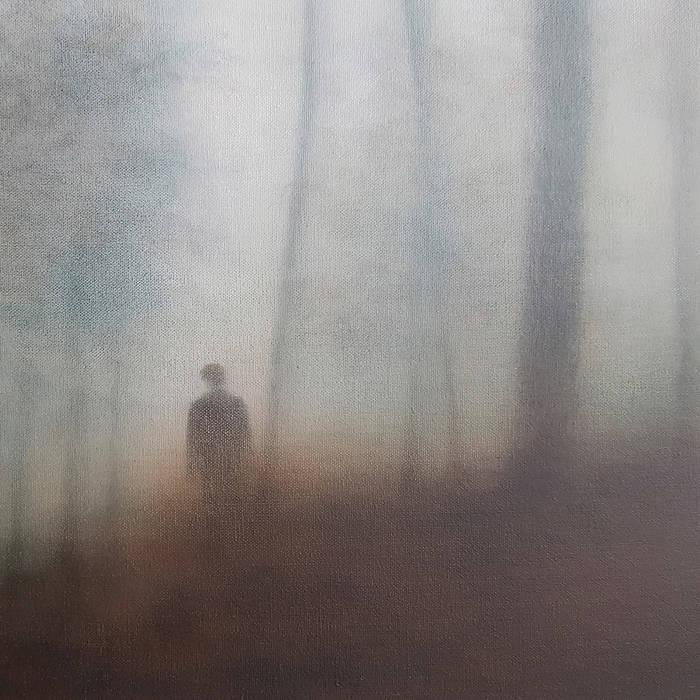 On the eighth solo album from the French-based British musician behind Third Eye Foundation, it is impossible to not compare Elliott's delivery to late bard Leonard Cohen. Elliott's accomplished Spanish guitar craft further add to the resemblance, particularly if followed by Cohen's final album Thanks for the Dance. Working as a solo artist since 2003, Elliott has achieved a new aural mastery on his latest work. At the start of the new decade, we face anticipatory grief, a collective loss of safety, and ultimately have been forced to bid Farewell to All We Know. Many artists use songwriting as a way of making sense of a bewildering world, and Elliott has crafted a perfectly timed accompaniment to grief, offering resignation and renewal with his heartfelt message "Maybe the storm has passed and devastated everything, now we just have to rebuild and live again."
On the eighth solo album from the French-based British musician behind Third Eye Foundation, it is impossible to not compare Elliott's delivery to late bard Leonard Cohen. Elliott's accomplished Spanish guitar craft further add to the resemblance, particularly if followed by Cohen's final album Thanks for the Dance. Working as a solo artist since 2003, Elliott has achieved a new aural mastery on his latest work. At the start of the new decade, we face anticipatory grief, a collective loss of safety, and ultimately have been forced to bid Farewell to All We Know. Many artists use songwriting as a way of making sense of a bewildering world, and Elliott has crafted a perfectly timed accompaniment to grief, offering resignation and renewal with his heartfelt message "Maybe the storm has passed and devastated everything, now we just have to rebuild and live again." The Opalio brothers have had quite an impressive history of adventurous collaborations over the years, as they have been joined by many of the most iconic figures in underground music, as well as an inspired array of interesting folks that I had not previously encountered. Naturally, a number of those unions have yielded wonderful results, but one of my favorites was the Opalios' pairing with Talweg/La Morte Young's Joëlle Vinciarelli for 2016’s Eternal Beyond. Several other artists have gamely and effectively adapted themselves to the brothers' unique aesthetic and working method over the years, yet Vinciarelli is the one who was most successful at finding and filling a space that made the collaboration feel like something more than the mere sum of its parts. More specifically, she brings some welcome bite and visceral intensity to the Opalios' phantasmagoric and alien reveries. Consequently, I am absolutely thrilled to report that this trio has now become a recurring project and that Eternal Beyond II is every good as its predecessor (if not even better).
The Opalio brothers have had quite an impressive history of adventurous collaborations over the years, as they have been joined by many of the most iconic figures in underground music, as well as an inspired array of interesting folks that I had not previously encountered. Naturally, a number of those unions have yielded wonderful results, but one of my favorites was the Opalios' pairing with Talweg/La Morte Young's Joëlle Vinciarelli for 2016’s Eternal Beyond. Several other artists have gamely and effectively adapted themselves to the brothers' unique aesthetic and working method over the years, yet Vinciarelli is the one who was most successful at finding and filling a space that made the collaboration feel like something more than the mere sum of its parts. More specifically, she brings some welcome bite and visceral intensity to the Opalios' phantasmagoric and alien reveries. Consequently, I am absolutely thrilled to report that this trio has now become a recurring project and that Eternal Beyond II is every good as its predecessor (if not even better).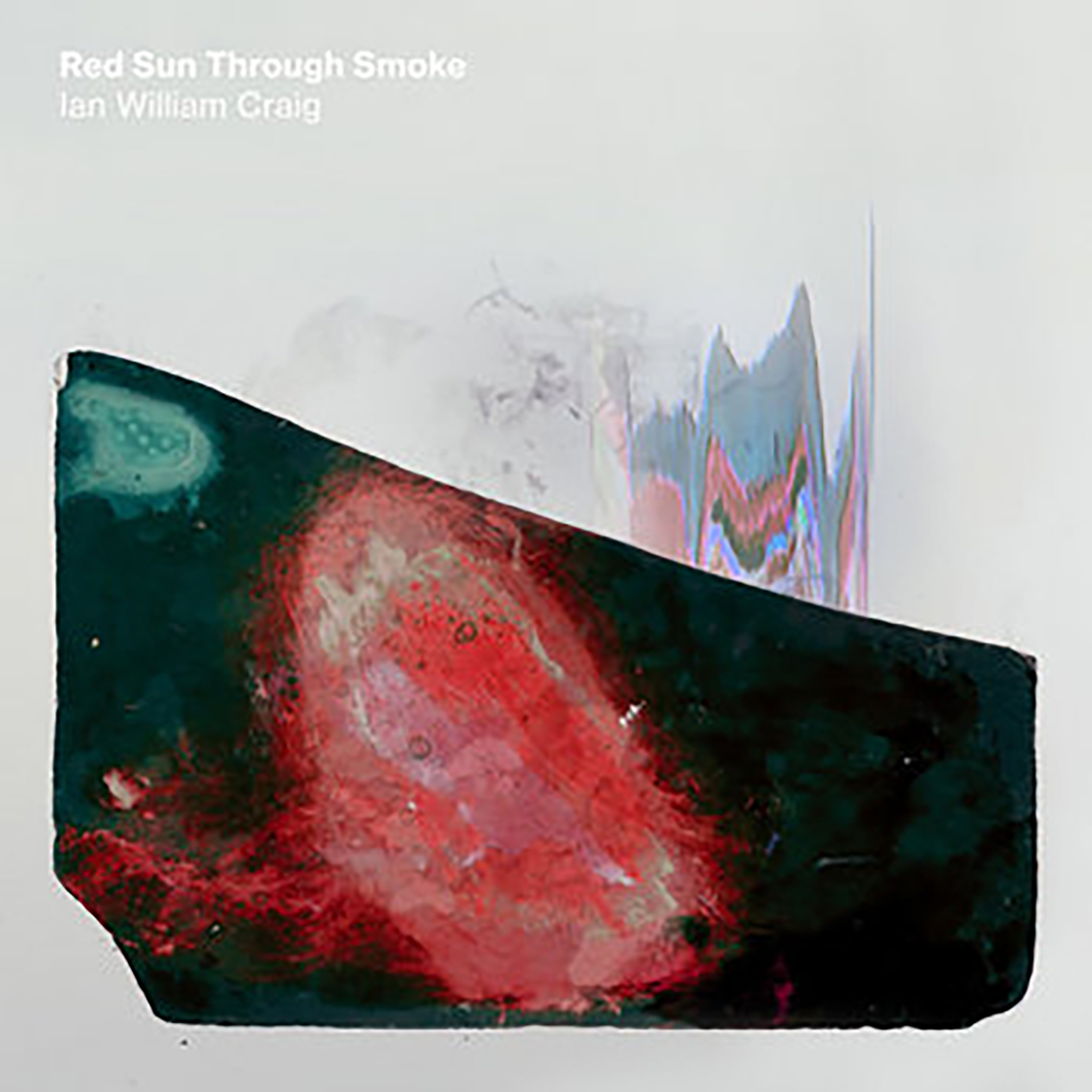 I am generally not someone who believes that everything happens for a reason or that tragedy breeds great art, but I do think that the emotionally fraught and unusual circumstances surrounding the creation of Red Sun Through Smoke steered Ian William Craig in a direction that feels uncannily appropriate for the current moment. Craig's original plan was simply to sequester himself for a couple weeks in his grandfather's empty house in Kelowna, British Columbia while he wrote and recorded a new album. As it turned out, however, fate had quite a macabre cavalcade of unpleasant surprises in store for him, as Kelowna became surrounded by forest fires, his grandfather died, his parents moved into the smoke-shrouded house, and the woman he loved moved to Paris. Naturally, all of those events resulted in quite an intense swirl of emotions, but at least a correspondingly intense (and beautiful) album ultimately emerged from that fraught period, as the best moments of Red Sun Through Smoke distill Craig’s art to its simplest, most direct, and most intimate form.
I am generally not someone who believes that everything happens for a reason or that tragedy breeds great art, but I do think that the emotionally fraught and unusual circumstances surrounding the creation of Red Sun Through Smoke steered Ian William Craig in a direction that feels uncannily appropriate for the current moment. Craig's original plan was simply to sequester himself for a couple weeks in his grandfather's empty house in Kelowna, British Columbia while he wrote and recorded a new album. As it turned out, however, fate had quite a macabre cavalcade of unpleasant surprises in store for him, as Kelowna became surrounded by forest fires, his grandfather died, his parents moved into the smoke-shrouded house, and the woman he loved moved to Paris. Naturally, all of those events resulted in quite an intense swirl of emotions, but at least a correspondingly intense (and beautiful) album ultimately emerged from that fraught period, as the best moments of Red Sun Through Smoke distill Craig’s art to its simplest, most direct, and most intimate form.
